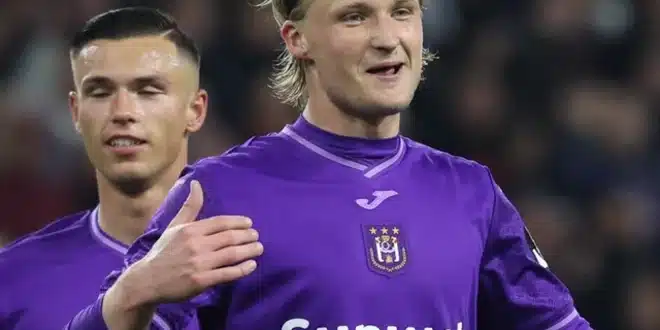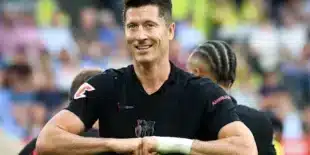BK Häcken’s ongoing participation in the UEFA Europa League has been marked by determination and growth, as the Swedish club steadily shapes its identity on the continental stage. Managed by Jens Gustafsson, the team is built around a dynamic mix of promising youth and seasoned experience.
In midfield, talents like Pontus Dahbo and Sanders Ngabo offer mobility and drive, while the frontline—featuring Amor Layouni and Srdjan Hrstić—brings flair and finishing power. At the back, defenders Nikola Zečević and Marius Lode form the spine of the backline, with goalkeepers Andreas Linde and Etrit Berisha providing a steady presence in goal.
Despite their ambition, Häcken’s Europa League journey so far has revealed the growing pains of a club still adjusting to the rigor of European competition. While there have been moments of promise, they have often lacked the cohesion and final-third quality needed to turn competitive performances into meaningful results.
Anderlecht Recharged Under Familiar Leadership
In Belgium, RSC Anderlecht is experiencing a tactical and cultural revival under returning head coach Besnik Hasi, who stepped in following Brian Riemer’s departure. Hasi, deeply familiar with the club’s DNA, has wasted no time in stabilizing the squad and bringing clarity to its play style. His current team is a well-balanced blend of seasoned internationals and rising prospects.
Veterans like Thorgan Hazard and Mats Rits bring leadership and technical assurance, while young talents such as Mihajlo Cvetković, Lucas Hey, and Zoumana Keita inject pace and enthusiasm. Midfield control lies in the capable hands of Yari Verschaeren and Theo Leoni, while Kasper Dolberg and Luis Vázquez offer dual threats up front with their sharp finishing and movement.
This renewed mix has not only revived Anderlecht’s domestic form but has also given them a sharper edge in European contests.
Previous Encounters: Anderlecht’s Tactical Edge
The two legs between these sides painted a clear picture: Anderlecht’s tactical discipline and game management were decisive. Both matches ended 1–0 in the Belgian club’s favor, a testament to their ability to remain composed under pressure while capitalizing on key moments. Häcken struggled to translate possession into penetration, particularly when faced with Anderlecht’s structured midfield and compact defense.
Even with patches of forward intent, the Swedish side was repeatedly frustrated by a team that executed a low-risk, high-efficiency game plan. Anderlecht’s pressing stifled transitions, and their forward line made the most of limited opportunities—hallmarks of a team prepared to adapt and survive in tough away fixtures.
Current Form: Anderlecht in Control, Häcken Under Strain
Looking beyond their head-to-heads, Anderlecht’s broader form underscores their growing consistency. Dominant 5–0 wins over Dordrecht demonstrated their attacking depth, while competitive 2–2 draws against Rakow and AEK Larnaca showed resilience even against technically polished opponents. These results hint at a side that can both grind and dazzle when the moment demands it.
Häcken, meanwhile, have struggled to find form. With 11 defeats in their last 15 domestic league matches, their recent track record highlights significant defensive vulnerabilities and an inability to sustain performance levels under pressure. Against top-tier opponents, their lack of structure in transition and susceptibility to counters have often been exposed.
Prediction
All signs point to another confident outing from RSC Anderlecht, whose ability to control midfield, punish defensive lapses, and adapt tactically has repeatedly made the difference in this matchup. While Häcken may get on the scoresheet—perhaps via a moment of individual brilliance or a late surge—the Belgian side’s attacking cohesion and superior in-game management are likely to secure a multi-goal victory.
Prediction: BK Häcken 1:3 RSC Anderlecht


